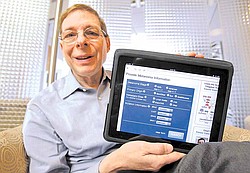Cancer survivor aims to collapse barriers with app
ASSOCIATED PRESS
In this Friday, Jan. 14, 2011 photo, Marty Tenenbaum, a survivor of the skin cancer melanoma, shows off his free app on his iPad in his Palo Alto, Calif., office. Tenenbaum, 67, is launching a free app with Cancer Commons, a set of online tools that help professionals study the disease and help with better treatments.
Associated Press
SAN FRANCISCO
In the late 1990s, Marty Tenenbaum was a hotshot e-commerce entrepreneur riding high on the dot-com boom when he noticed a lump on his body.
His doctor told him it was nothing, but when he finally had it removed, he learned he had melanoma, the deadliest form of skin cancer.
He beat the disease, but he never got over the sense of frustration he felt as he clawed his way through the maze of treatment options, clinical trials and research in search of a way to survive.
Now 67, Tenenbaum still believes he would not have made it if he hadn’t had personal connections at the National Cancer Institute who guided him toward cutting-edge experimental treatments that saved his life.
The experience convinced him that the key to advancing cancer treatment and research is forging connections on as large a scale as possible. On Tuesday, he plans to launch a Web application to bring together patients, physicians and scientists regardless of where they work, live or went to college in hopes that the so-called wisdom of the crowd can lead to the best therapies.
“I’m just trying to pull together all the pieces that are needed to do a real, rational attack on cancer,” Tenenbaum says. The way to do that, he says, is to pull people out of their individual labs, offices and hospitals to collaborate in a way not possible before the Web and mobile technologies made it easy to pool vast amounts of information.
“How much of cancer could be turned into a manageable disease if we only knew what we knew?”
Tenenbaum is one of a growing number of supporters of the so-called open- science movement, which calls for greater sharing of research and the lowering of institutional, financial, legal and geographical barriers to bringing the best minds and data together to solve science’s toughest problems.
In its fledgling form, the Cancer Commons app integrates the data on various forms of melanoma and the most-promising experimental treatments. Patients or their doctors input how far the disease has progressed, where it started and whether tests have discovered any specific genetic mutations believed to contribute to the cancer’s spread.
From that information, the app tells patients what specific cancer “subtype” they have as determined by an expert panel. They also learn what drugs have shown the most promise in treating that specific form of the disease and where clinical trials are being conducted that could allow patients access to that treatment.
 43
43

